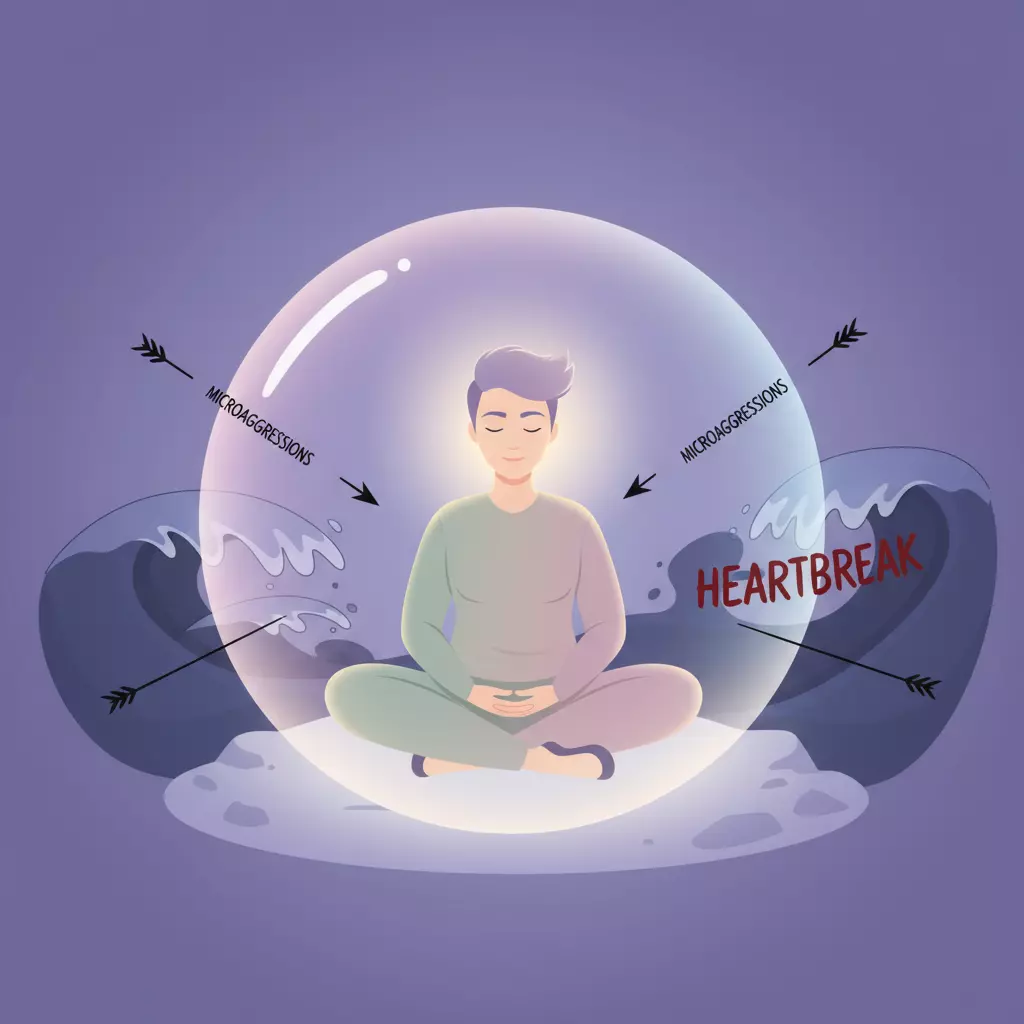Table of Contents
You’ve been holding the line—no calls, no texts, no late-night scrolling through their socials. And then it happens: a casual “joke” at work about your pronouns, or a stranger’s offhand comment that slices deeper than they’ll ever realize. Suddenly, your chest tightens, and your brain whispers, just one message to the ex, it’ll help. That’s the moment when micro-aggressions collide with heartbreak, and a queer breakup relapse starts calling your name.
Why relapse hits harder for queer folks
Research shows that after a breakup, the brain treats longing like a craving. Your attention bends toward your ex the way it would toward a substance you’re trying to quit. That craving isn’t imagined—it’s measurable in brain waves and attention bias.
But for queer folks, the craving is amplified:
- Microaggressions heighten baseline stress
- Anxiety and depression risk is already elevated
- The breakup wave crashes into waters already turbulent
The result? A stronger pull to relapse—not because you’re “failing,” but because your nervous system is carrying extra weight.

The hidden link between microaggressions and breakup crashes
Microaggressions are often dismissed as “small things,” but the science is clear: they stack.
Each one lands as a stressor, priming your body’s fight-or-flight system. Over time, this buildup increases risk for:
- Self-harm
- Anxiety
- Suicidal thoughts
Now add a breakup. It’s like pouring salt into an open wound. Every sting destabilizes the nervous system further.
When destabilized, reaching out to an ex can feel like medicine. But naming this dynamic helps dissolve shame: relapse risk is structural, not moral.
You’re not weak—you’re carrying more.

No Contact Isn’t a Game – It’s a Healing Strategy
Let’s examine the No Contact strategy in: Science & Psychology, Planning it, Digital Hygiene, Relapses-Cravings & Crashes, Special Cases & Exceptions… and Signs that it’s working +What comes next.
Tap here to read more →Protecting your nervous system, keeping your streak
The good news: research points to strategies that work.
- Negative reappraisal: focus on your ex’s flaws or the reasons it didn’t work. This reduces longing, even if it hurts in the short term.
- Distraction: immerse yourself in positive, unrelated activities. This boosts mood and lessens your ex’s mental grip.
- Affirming environments: surround yourself with queer-affirming people and spaces. They act as a buffer against microaggression damage and relapse risk.

Breakups already ask a lot of us. For queer folks, they ask even more.
But your healing isn’t a test of willpower—it’s a process of protecting your nervous system while you rebuild.
Every day you resist the pull, every time you choose support over relapse, you’re not just “keeping a streak.”
You’re teaching your body what safety feels like again.
And that’s how moving on begins—one quiet act of protection at a time.
FAQ
Q1. What makes queer breakup relapse different from other breakups?
Queer breakup relapse is often intensified by microaggressions and stigma. These constant stressors overload the nervous system, making the urge to reach out to an ex or fall back into old patterns stronger than in non-queer contexts.
Q2. How do microaggressions affect the healing process after a breakup?
Microaggressions stack up as ongoing stressors, raising anxiety and depression risk. When combined with the emotional crash of a breakup, they destabilize the nervous system, which can trigger relapse behaviors like contacting an ex.
Q3. What strategies help prevent relapse during queer breakup recovery?
Evidence supports three main strategies: negative reappraisal (focusing on reasons the relationship didn’t work), distraction (engaging in positive activities), and surrounding yourself with affirming environments. These approaches reduce cravings and protect your streak.
Q4. Is craving your ex after a breakup normal?
Yes. Research shows that longing for an ex activates brain regions similar to craving in addiction. Recognizing this as a normal response, especially in queer breakup relapse, helps reduce shame and encourages healthier coping strategies.
Scientific Sources
-
Wright, T. et al. (2025): The association between microaggressions and mental health among UK trans people: a cross-sectional study
Key Finding: 97.6% of trans adults reported lifetime exposure to microaggressions; higher exposure was significantly associated with depression, anxiety, suicidal thoughts, and self-harm.
Why Relevant: Microaggressions amplify baseline stress, making queer folks more vulnerable to relapse and crashes during breakup recovery.
https://pubmed.ncbi.nlm.nih.gov/39325174/ -
Paschen-Wolff, M. M. et al. (2024): Experiences of and recommendations for LGBTQ+-affirming care in substance use (SU) services
Key Finding: Stigma and non-affirming care were linked with relapse and stress; affirming care reduced relapse and improved engagement in recovery.
Why Relevant: Shows how affirming environments buffer against relapse—applicable both to substance use and breakup healing in queer contexts.
https://substanceabusepolicy.biomedcentral.com/articles/10.1186/s13011-023-00581-8 -
Langeslag, S. J. E. & Sanchez, M. E. (2018): Down-regulation of love feelings after a romantic break-up: Self-report and electrophysiological data
Key Finding: Negative reappraisal and distraction both reduced attentional bias toward an ex; negative reappraisal reduced love feelings but worsened mood, while distraction improved mood without lowering love feelings.
Why Relevant: Breakup cravings are real, like addiction cravings; this study provides evidence-based strategies to reduce relapse risk.
https://pubmed.ncbi.nlm.nih.gov/28857575/
- Proven Healing: How an Accountability Buddy Transforms Breakup Recovery with Weekly Check-ins

- Breakup Anniversary Survival Guide: Heal, Prevent Relapse & Move Forward

- Slip-Up Repair Plan: How to Recover After No Contact Relapse Without Shame

- Queer Breakup Relapse Recovery: Protect Your Nervous System & Keep Your Streak Strong

- Transgender Grounding Techniques: Powerful Ways to Ease Dysphoria & Healthcare Stress

- Chosen Family Support for Lesbian Women: Powerful Healing Without Looping the Story

- Gay Men Jealousy Reset: Fast Ways to Calm Spikes After Seeing Your Ex

- Women & Nighttime Rumination: 5 Powerful Steps to Heal and Sleep Better

- Men & the Delayed Grief Spike: A Powerful 60-Minute Healing Protocol

Leave a Reply